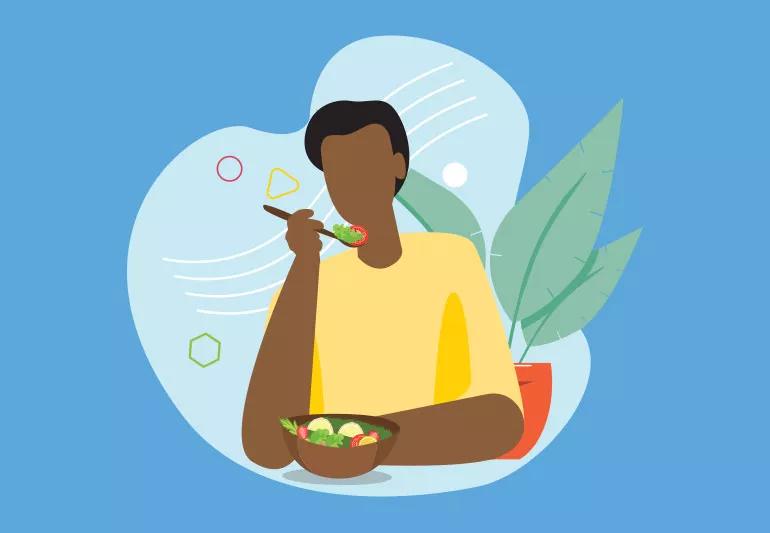How a dieting mindset keeps the weight on

Image content: This image is available to view online.
View image online (https://assets.clevelandclinic.org/transform/1b528815-0664-45eb-83c6-210df1feb77f/manDiet-1261447673-770x533-1_jpg)
man on a diet eating salad
We’ve all been there — after a month of being “good” on your New Year’s diet, you attend a party (mask on, of course) for the big game that’s bursting with treats.
Advertisement
Cleveland Clinic is a non-profit academic medical center. Advertising on our site helps support our mission. We do not endorse non-Cleveland Clinic products or services. Policy
Suddenly, corn chips and chili dip are calling your name, and you can’t concentrate on the game because you’re spending all of your mental energy trying to avoid those tempting treats.
When you finally give in, you feel guilt, shame and lowered self-esteem.
Combine these feelings with the idea that since you’ve blown your diet, you might as well eat more before you go back to being “good” tomorrow, and you have weight gain.
So, how can you get rid of the guilt and reset your brain to make smart choices?
Dietitian Anna Taylor, MS, RD, LD, CDCES, and bariatric behavioral health expert Leslie Heinberg, PhD, talk about how to change your thinking around dieting.
Dieting may seem like a great New Year’s resolution, but when we limit how much we eat, it can affect our body in ways we didn’t predict.
“Several things happen in our bodies when we restrict our food intake,” says Taylor. “We know that our metabolism slows, and the hormones that regulate our feelings of hunger and fullness get out of whack. You end up overeating, not because you are bad or weak, but because your body is doing everything it can to get out of your self-imposed famine.”
Even when you’re not actively on a diet plan, your dieting mindset can cause you to eat more and gain weight. You may eat more than you normally would, anticipating that soon, you’ll be back on a restrictive diet.
Advertisement
“From an evolutionary perspective, our bodies are more tuned to survive in times of famine,” Taylor says. “The body of the yo-yo dieter is accustomed to having random times of food shortage or restriction. Therefore, the body strives to eat and store more overall. The human body does not like to lose weight, so it fights back.”
Several studies have shown that restrictive dieting ultimately leads to weight gain, not weight loss. But studies have also shown that self-esteem can predict dieting outcomes.
“When you work on reducing your guilt and shame around food and better body image acceptance, you tend to develop better eating habits over the long term,” says Dr. Heinberg.
A dieting mindset also tells you that your food decisions reflect on your worth as a person.
You are eating “bad” foods, so you must be a bad or weak or unworthy person. This can perpetuate a cycle of emotional eating that adds excess weight, reduces self-esteem and is tough to end.
Work on stopping the negative thoughts in your head and adopt these tips to encourage a better relationship with food and eating healthy.
Ultimately, what works for weight loss in the long-term is small, incremental changes to your overall eating patterns. And the less you focus on restricting and categorizing foods and the more you focus on creating healthy behaviors around food and exercise, the healthier your body — and mind — will be.
Advertisement

Sign up for our Health Essentials emails for expert guidance on nutrition, fitness, sleep, skin care and more.
Learn more about our editorial process.
Advertisement
Actively choose healthy habits not only when it comes to food and nutrition, but also physical activity and your mental health
Trying fad diets and skipping meals won’t do you any favors
Wearing this undergarment for too long will do more harm than good
Quick weight loss is possible, but it’s not sustainable
You can lose 15% of your body weight, plus lower your heart disease and diabetes risks
A safe and effective surgery that shouldn’t be considered only as a last resort
Focus on physical activity and foods that pack a nutritional punch to help you lose weight
Skip this unproven, unsafe and unregulated weight-loss practice
Type 2 diabetes isn’t inevitable with these dietary changes
Applying a hot or cold compress can help with pain
Pump up your iron intake with foods like tuna, tofu and turkey